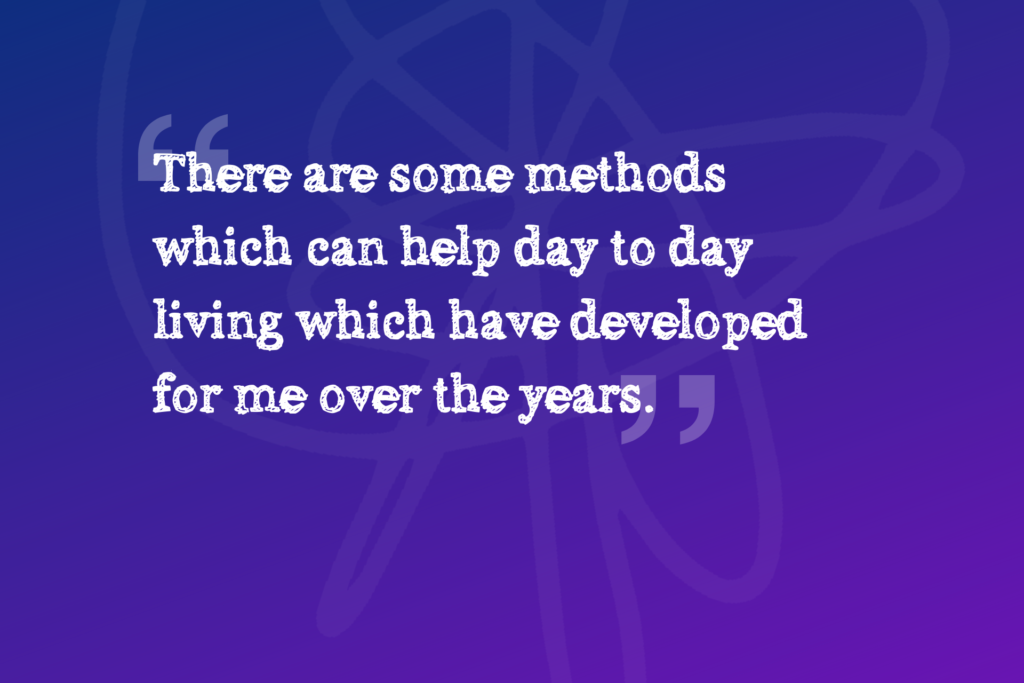An Oxfordshire Mind Expert by Experience blogs about his Bipolar disorder.
Trigger warning, contains discussion of suicidal feelings. Mental health crisis support.
Bipolar is a mood disorder where changes of mood can bring other symptoms of mental disorder further down the line. It is thought to be caused by an imbalance of chemicals in the brain and may have familial links. Bipolar disorder by its nature is the mental health condition that can throw the most at the sufferer. Going from the depths of despair and via euphoria to psychosis, with various potential mixed states involved.
There is sadly no cure, just medications, mood records and therapies (which are hard to access via the NHS) for management of the condition. Medications often cause side-effects such as weight gain, drowsiness and tremors but if they work they can save the sufferer significant turmoil. There are some other methods which can help day to day living which have developed for me over the years and others that are fairly recent evidence-based methods of staying well.
My Youth
My name is Lyndsay, my childhood was for the most part very joyful. My family moved from coastal New Zealand to England when I was in primary school. We then moved between the northwest and south of England twice. At school I was academic, fairly popular and enjoyed some sports (not cross-country running). I got good GCSE grades at my very good comprehensive school.
Unfortunately just at the point of starting A-levels my family moved 180 Miles south which ultimately had negative affect. Looking back, the first time I remember feeling depressed (for a week or more) was when I was 17 and I had failed a driving test (having a panic attack). I just thought it was normal at the time, life at that age is often tumultuous.
Bipolar Disorder most commonly presents with symptoms in adolescence but the average time to correct diagnosis is 10 years, for me this is was 16 (in my late 30s), making it very hard to receive appropriate treatment. I was able to travel to university despite disappointing A-level results due to technical problems of studying on two distant sites with coinciding lesson times, and lack of transport. Reflecting now, I lacked self-confidence also.
In my second year of University I moved in with what we’re friends at the time, who undermined me mentally and harmed my self-confidence. I visited the on-campus doctor and was told I was suffering from anxiety and depression and recommended taking Seroxat (Paroxetine) an SSRI (a Selective Serotonin Re-uptake Inhibitor) antidepressant medication. There were no other alternatives.
Adulthood
I was able to finish my degree, knowing I didn’t fulfil my academic potential. Living with social and performance anxiety and related depression made having a career and navigating relationships very challenging. During that period I was on some fairly high doses of SSRI’s on and off but didn’t meet the criteria for referral to an AMHT (Adult Mental Health Team). It wasn’t until I became more and more euphoric during the London Olympics and Paralympics in 2012 that things changed in my illness.
This manic behaviour lead ultimately to psychosis resulting in a hospitalisation on a psychiatric ward. During that stay I was diagnosed with Bipolar Affective Disorder and was given some related medications, i.e. mood stabilisers and an anti-psychotic drug. The benefit of these pharmaceuticals is that I no longer have periods of depression (I do however struggle upon waking with tiredness and low mood.
Generally my mood is consistent through the rest of the day which is most of the battle with Bipolar Disorder. For my illness good sleep is of paramount importance and furthermore sleep hygiene. It is useful to note where there is a lack of sleep and a surplus. Also mood charts are available to track where you are on the Bipolar spectrum which can be useful in indicating if a problematic period is beginning.
Living well with Bipolar Disorder
After being diagnosed correctly eventually, I started to take exercise seriously. I was referred by my GP the local council run sports centre to use the gym at a subsidised rate. I lost 2 stone of medication weight and got many other benefits, like a calmness and improved mental clarity. In lockdown I have done a lot of walking along with cycling and using a home cross-trainer (bought in lockdown) that has been a godsend. Mindfulness meditation, and breathing/relaxation exercises are useful tools to buy space for the mind to recover temporarily or long term.
Finding acceptance with how things are is a really underrated but effective method for improving one’s mood. A Bipolar diagnosis can have significant effects and we can’t change everything. Some things we have to understand may not even change in the long term. We can try to live well with symptoms or even adapt and cultivate new alternative lifestyles.
I have adopted quite a lot of different coping strategies, I find gardening very relaxing and it’s a good way to stay active without being so conscious of it. I maintain a mostly healthy diet and like to grow my vegetables and cook from scratch. Many people with Bipolar Disorder find they are particularly inclined to creative or problem solving pursuits and many famous artists have Bipolar. I have found facilitating my local Bipolar UK Support Group (as a volunteer) has enabled me to give something back to my peers. I have done other voluntary work in other contexts which has helped my own health and am always pleased when someone trusts me enough to open up about their health.


